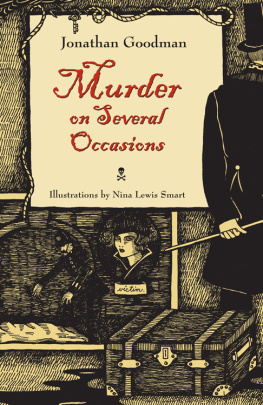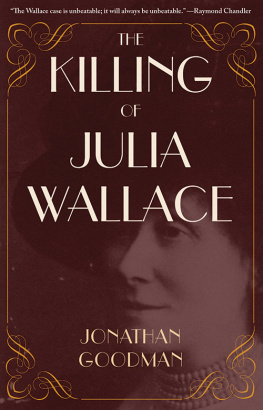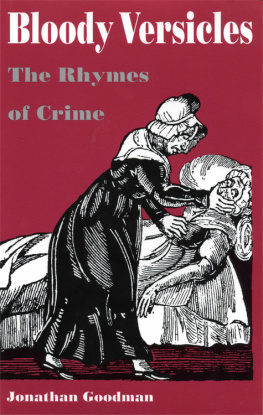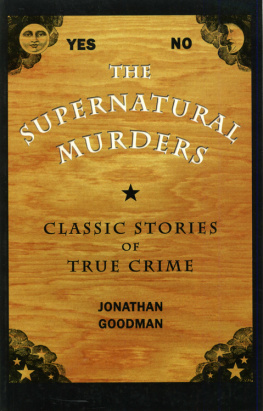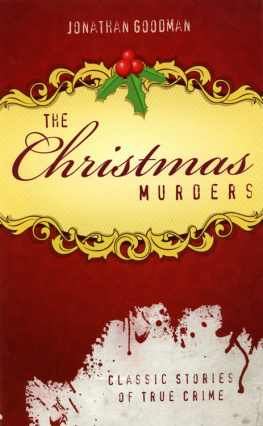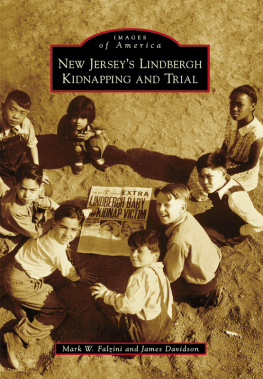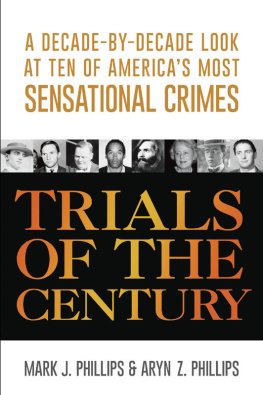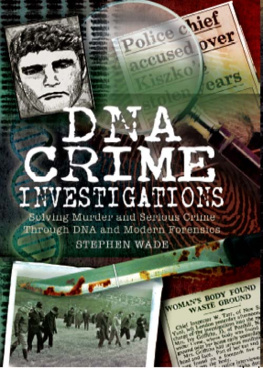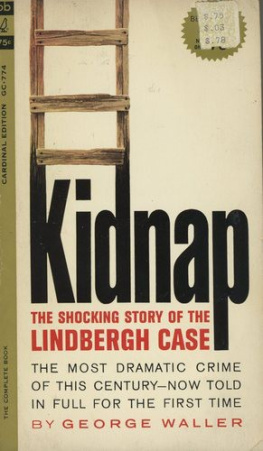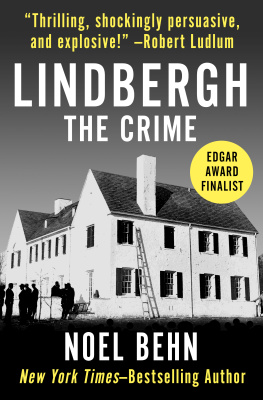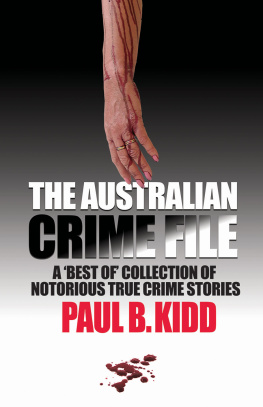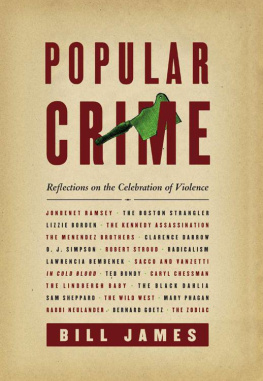The Passing on the Fourth Floor Back and Slaughter at the Governors Lodge first appeared in Murder in High Places (London, Piatkus Books, 1986).
Goodman, Jonathan.
Murder on several occasions / Jonathan Goodman.
p. cm. (True crime series)
ISBN-13: 978-0-87338-898-6 (pbk. : alk. paper)
ISBN-10: 0-87338-898-4 (pbk. : alk. paper)
1. MurderCase studies. I. Title.
British Library Cataloging-in-Publication data are available.
Sparked by two of my collections of essays, Murder in High Places and Murder in Low Places, Jacques Barzun suggested that every geographical level has been scanned by our tireless crime chronicler except perhaps the middle distance, and went on to grumble: It seems no longer possible to publish studies of crime without attaching them to some extraneous feature that provides a link.
Apropos of the latter comment, I was, of course, surprised, also delighted, to be asked by the enterprising Kent State University Press to put together an assortment of essays, diverse apart from being about murder.
Jacques Barzun calls me a crime chroniclerand (I had forgotten) I notice that in one of the pieces I have included here, written a long, long time ago, I used the same term. Betteroh, so much betterthan criminologist, which was the invariable job title when I turned to crime. I am advised to say that I am sure that criminologists are worthy people; but, even so, neither I nor any of the colleagues I respect has the least interest in, or slightest use for, their statistics, extrapolations, and psychiatric guesses. No; for many years now I have quietly campaigned (eventually, I believe, successfully) for acceptance of crime historianhistorian being preferable to chronicler because a chronicle is a bare-bones retelling, without analysis or interpretation, and an account of a case should surely be subjectiveshould permit the expression of personal likes and dislikes, the inclusion of associated peculiarities.
For me, the peculiarities are usually of a theatrical kind (and I have just been amazed, looking at my account of the Brighton Trunk Crimes, that I somehow resisted the temptation to attach a footnote to the first of its several references to the adjacent town of Hove, noting that in the programme for a Brighton light-operatic societys production of Oklahoma! a misprint appeared in the list of musical numbers, giving local significance to one of them by entitling it People Will Say Were in Hove.
Grimness is sufficiently in the tales; there is no need for it in the telling of them. Remembering that if the s is detached from slaughter, one is left with laughter, I hope that my sense of (often gallows) humour, my delight in unintended oddities, chimes with yours.
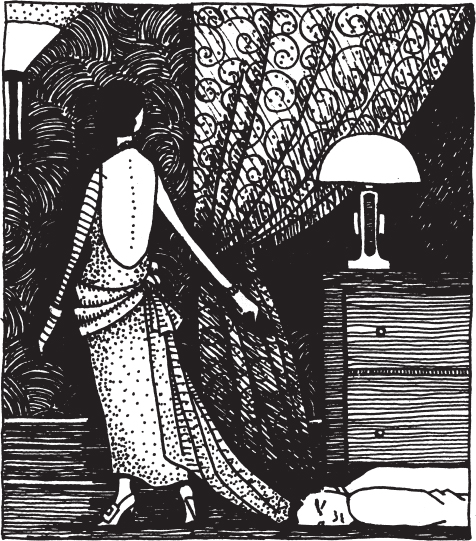

Were you born of some queer magic,
In your shimmering gown?
Is there something strange and tragic,
Deep, deep down?
Nol Coward
THE PASSING ON THE FOURTH FLOOR BACK
I start uncertainly. I believe that the slaying of Prince Ali Kamel Fahmy Bey was the first murder case I heard of, but I may be wrong. Perhaps earlier tellings of other murders had gone in one twice-daily-washed ear and out the other.
My parents were unconventional bedtime tale-tellers: they referred to, but never actually told me, fairy stories, assuming that I would prefer to hear how Dorothy Ward, boyish as Jack, had scaled a giant beanstalk and, vanishing from the audiences view, received rapturous applause for her vertical exit; of the Australian Oscar Asche, sort of Chinese as Chu-Chin-Chow; of Jose Collins, the exalted Maid of the Mountains; of Phyllis Neilson-Terry, masculinized as Oberon at the Open Air Theatre in Regents Park; of young Meggie Albanesi, a bright flame that suddenly died. My parents, as you will have gathered, were great ones for the theatre. And, for them, theatre was not confined to the stage. They were what would now be called, I suppose, lateral thinkers: memories were corroborated by other memories, or were jogged into being mentioned by recollection of things that had happened at the time, or in the locality, of things that had stayed, higgledy-piggledy, in their minds.
I know the day of the month when I first heard of the Fahmy case: the seventeenth day of a January between King Edward VIIIs announcement on the wireless that he had abdicated (I was too young to be awake for it) and Prime Minister Neville Chamberlains announcement on what people were starting to call the radio that Great Britain was at war with Germany. (I heard that in the cottage at Castle Combe to which, presciently, I had been evacuatedand from which, later that day, I, hopelessly homesick, would be driven back to dangerous London. Certainly selfishly, perhaps irrationally, I hated the Germans, not long enough ago calling themselves the master race, for having taken away part of my childhood.)
On that 17 January, a birthday for me, my Aunts Amy, Henrietta, and Rachel were supposed to call; for days before, my mother had unsubtly hinted that if I behaved myself, the aunts would bear gifts. Butand this could probably fix the yearby the time the table was laid, cake and all, it had started to rain, to pour. The hour arranged for the aunts arrival passed; my father returned, dripping wet, from work; we were not on the phone, and so the auntswho had told my mother that they would gather together in Putney and travel en masse to Wimbledoncould not explain to us the reason for their absence. I was told, first, to stop making naughty faces, and then to sit at the table, to sit up straight, to eat my allotment of the birthday feast, sticking to the established order of fishpaste sandwich, buttered scone with raspberry preserve, a helping of pink junket, and, if I really wanted it, a slice of the centrepiece cake (which, my memory says, had not been decked with candles for me to blow out).

